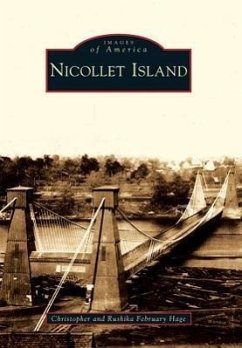Above St. Anthony Falls, in the middle of the Mississippi River, hidden in the heart of Minneapolis, lies Wita Waste, the beautiful island. Named Wita Waste by Dakota Indians, it is known now as Nicollet Island, the only inhabited island in the Mississippi. Over the centuries, it has been a sacred birthing place, at the center of the lumber and flour-milling industries that built Minneapolis, and involved in the collapse of the Eastman tunnel, which almost doomed those industries. One of Minneapolis's largest fires, the great conflagration of 1893, started there. It has been the home of pioneers, veterans, elite barons of the Gilded Age, Roman Catholic monks, hippies, artists, vagrants, and donkeys. Many of their houses still remain, preserving Minneapolis's architectural heritage. Nicollet Island has been at the center of numerous controversies ranging from its original land claim to proposals to locate the state capitol there, to, more recently, the threatened demolition of its historic houses. Nicollet Island is the history of Minnesota in miniature, and its tale is one of beauty, romance, disaster, and conflict.








